Unit 14 I remember meeting all of you in Grade7.复习课件 人教版九年级英语全册 (共42张PPT)
文档属性
| 名称 | Unit 14 I remember meeting all of you in Grade7.复习课件 人教版九年级英语全册 (共42张PPT) | 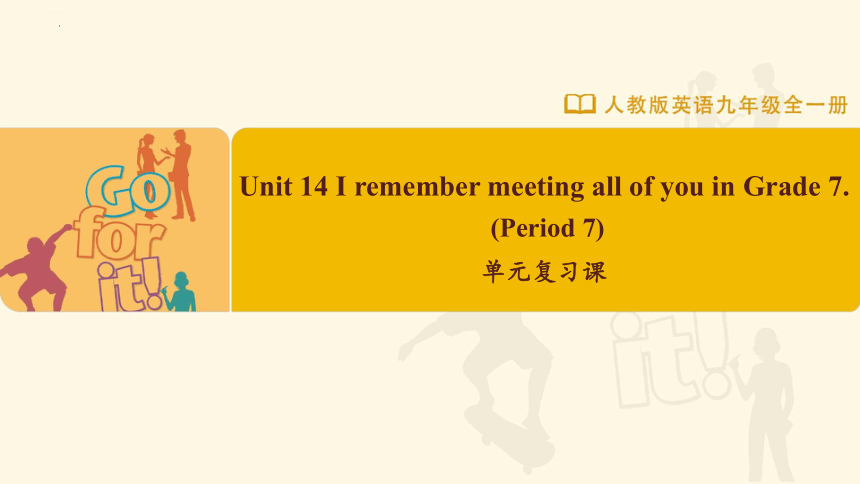 | |
| 格式 | pptx | ||
| 文件大小 | 1.2MB | ||
| 资源类型 | 教案 | ||
| 版本资源 | 人教新目标(Go for it)版 | ||
| 科目 | 英语 | ||
| 更新时间 | 2023-10-20 20:27:01 | ||
图片预览

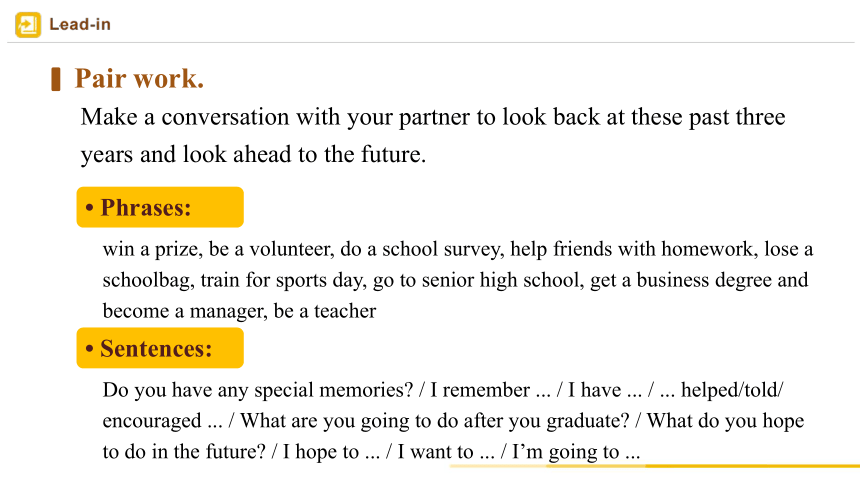
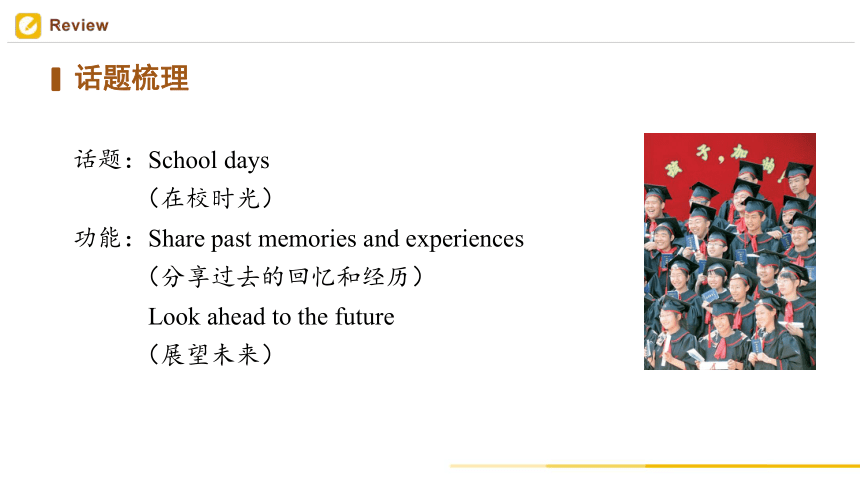
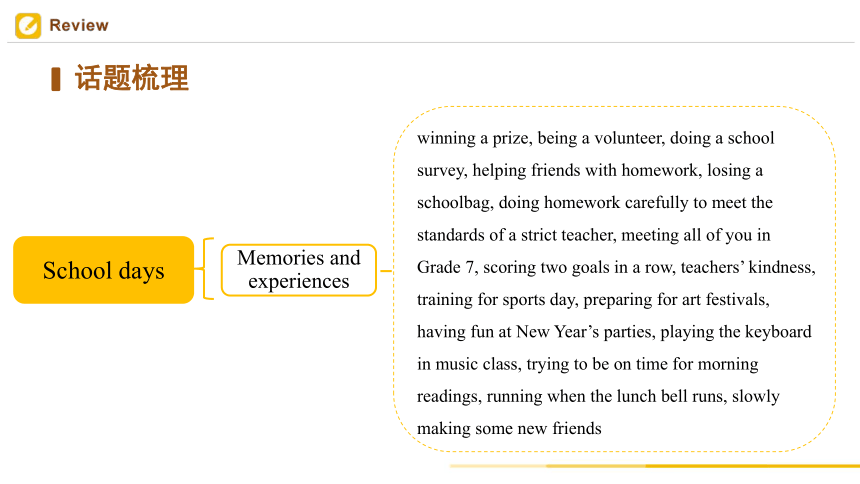
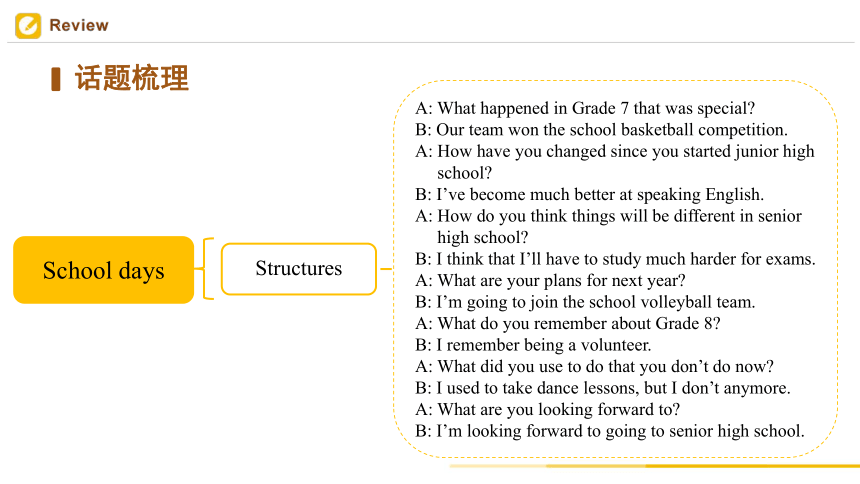
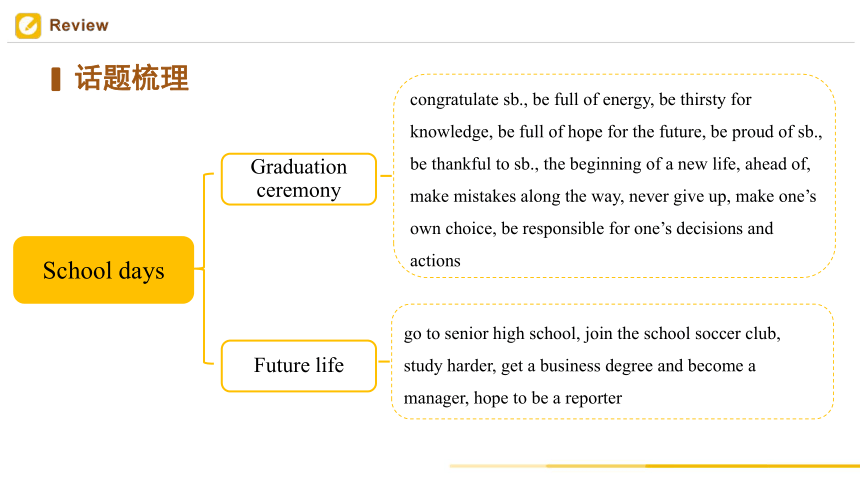
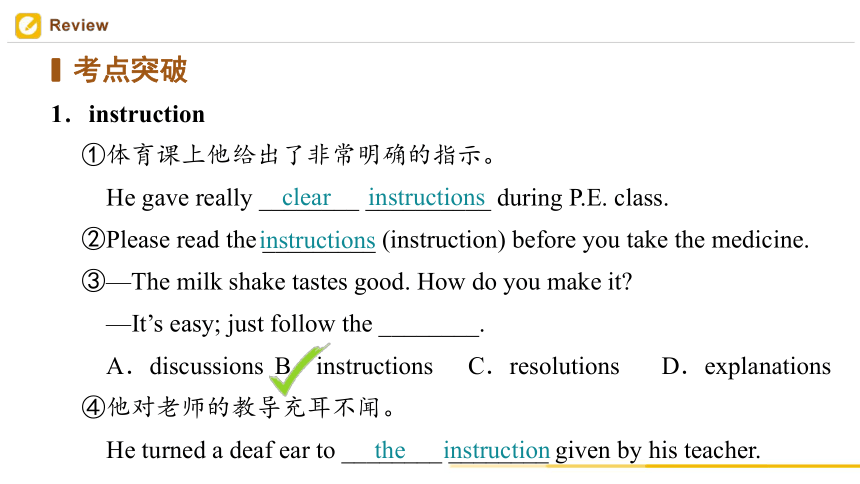
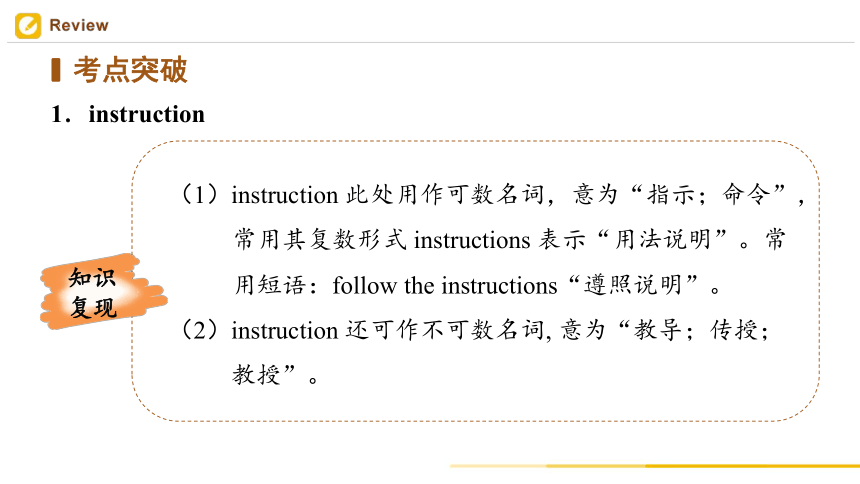
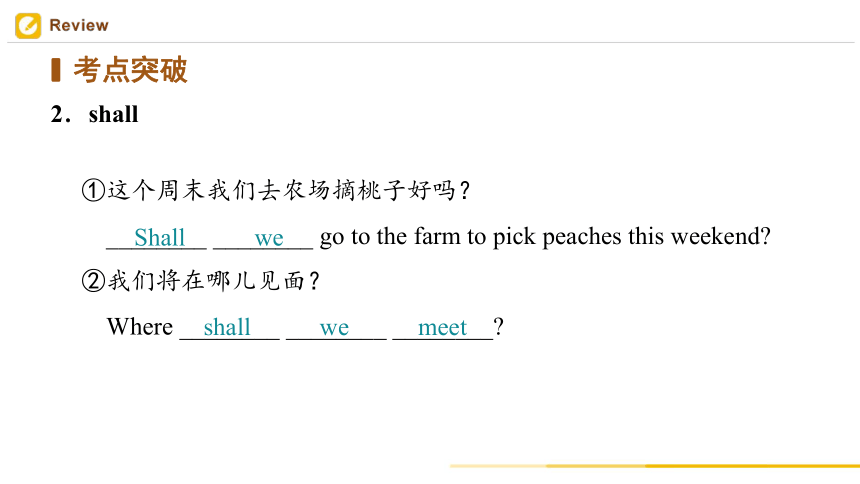
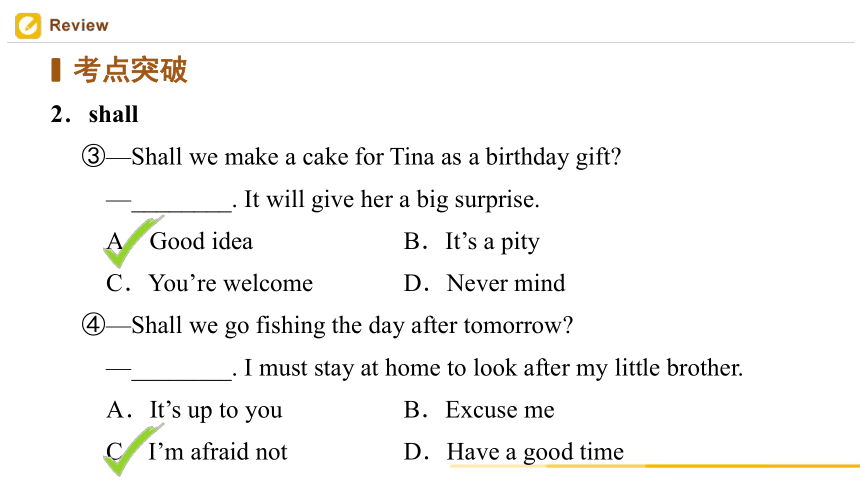
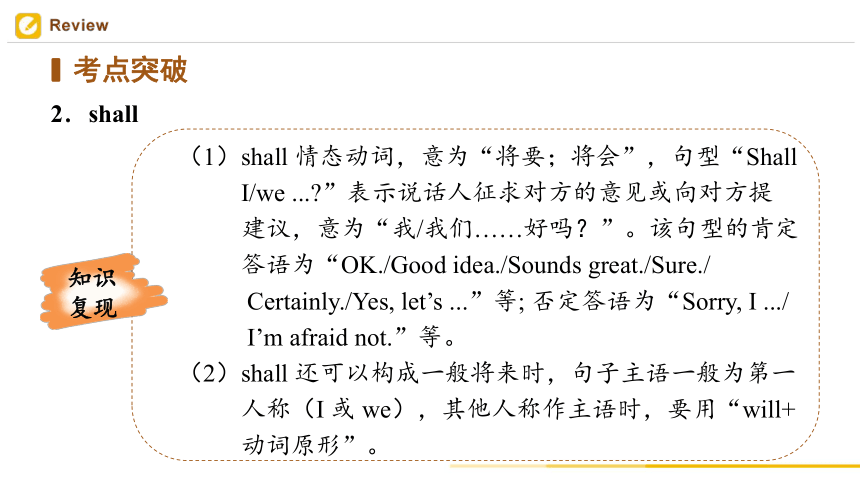
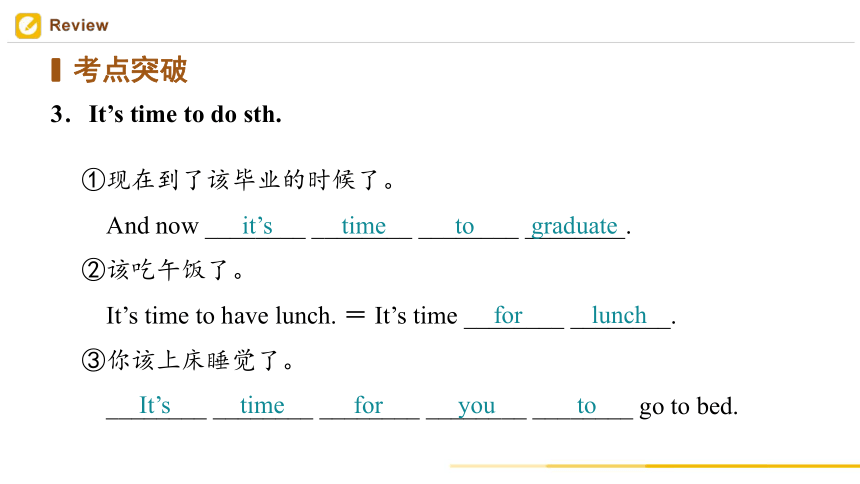
文档简介
(共42张PPT)
Unit 14 I remember meeting all of you in Grade 7.
(Period 7)
单元复习课
Pair work.
Phrases:
Sentences:
Make a conversation with your partner to look back at these past three years and look ahead to the future.
Do you have any special memories / I remember ... / I have ... / ... helped/told/ encouraged ... / What are you going to do after you graduate / What do you hope to do in the future / I hope to ... / I want to ... / I’m going to ...
win a prize, be a volunteer, do a school survey, help friends with homework, lose a schoolbag, train for sports day, go to senior high school, get a business degree and become a manager, be a teacher
话题:School days
(在校时光)
功能:Share past memories and experiences
(分享过去的回忆和经历)
Look ahead to the future
(展望未来)
话题梳理
winning a prize, being a volunteer, doing a school survey, helping friends with homework, losing a schoolbag, doing homework carefully to meet the standards of a strict teacher, meeting all of you in Grade 7, scoring two goals in a row, teachers’ kindness, training for sports day, preparing for art festivals, having fun at New Year’s parties, playing the keyboard in music class, trying to be on time for morning readings, running when the lunch bell runs, slowly making some new friends
话题梳理
School days
Memories and experiences
A: What happened in Grade 7 that was special
B: Our team won the school basketball competition.
A: How have you changed since you started junior high
school
B: I’ve become much better at speaking English.
A: How do you think things will be different in senior
high school
B: I think that I’ll have to study much harder for exams.
A: What are your plans for next year
B: I’m going to join the school volleyball team.
A: What do you remember about Grade 8
B: I remember being a volunteer.
A: What did you use to do that you don’t do now
B: I used to take dance lessons, but I don’t anymore.
A: What are you looking forward to
B: I’m looking forward to going to senior high school.
School days
Structures
话题梳理
congratulate sb., be full of energy, be thirsty for knowledge, be full of hope for the future, be proud of sb., be thankful to sb., the beginning of a new life, ahead of, make mistakes along the way, never give up, make one’s own choice, be responsible for one’s decisions and actions
Graduation ceremony
School days
Future life
话题梳理
go to senior high school, join the school soccer club, study harder, get a business degree and become a manager, hope to be a reporter
①体育课上他给出了非常明确的指示。
He gave really ________ __________ during P.E. class.
②Please read the _________ (instruction) before you take the medicine.
③—The milk shake tastes good. How do you make it
—It’s easy; just follow the ________.
A.discussions B.instructions C.resolutions D.explanations
④他对老师的教导充耳不闻。
He turned a deaf ear to ________ ________ given by his teacher.
考点突破
1.instruction
clear instructions
instructions
the instruction
考点突破
1.instruction
知识复现
(1)instruction 此处用作可数名词,意为“指示;命令”,
常用其复数形式 instructions 表示“用法说明”。常用短语:follow the instructions“遵照说明”。
(2)instruction 还可作不可数名词, 意为“教导;传授;
教授”。
①这个周末我们去农场摘桃子好吗?
________ ________ go to the farm to pick peaches this weekend
②我们将在哪儿见面?
Where ________ ________ ________
考点突破
2.shall
Shall we
shall we meet
③—Shall we make a cake for Tina as a birthday gift
—________. It will give her a big surprise.
A.Good idea B.It’s a pity
C.You’re welcome D.Never mind
④—Shall we go fishing the day after tomorrow
—________. I must stay at home to look after my little brother.
A.It’s up to you B.Excuse me
C.I’m afraid not D.Have a good time
考点突破
2.shall
考点突破
2.shall
知识复现
(1)shall 情态动词,意为“将要;将会”,句型“Shall
I/we ... ”表示说话人征求对方的意见或向对方提
建议,意为“我/我们……好吗?”。该句型的肯定
答语为“OK./Good idea./Sounds great./Sure./
Certainly./Yes, let’s ...”等; 否定答语为“Sorry, I .../
I’m afraid not.”等。
(2)shall 还可以构成一般将来时,句子主语一般为第一
人称(I 或 we),其他人称作主语时,要用“will+
动词原形”。
①现在到了该毕业的时候了。
And now ________ ________ ________ ________.
②该吃午饭了。
It’s time to have lunch. = It’s time ________ ________.
③你该上床睡觉了。
________ ________ ________ ________ ________ go to bed.
考点突破
3.It’s time to do sth.
for lunch
it’s time to graduate
It’s time for you to
考点突破
3.It’s time to do sth.
知识复现
(1)“It’s time to do sth.”表示“该做某事了;做某事
的时候到了”,相当于“It’s time for sth.”。
(2)It’s time for sb. to do sth.“到了某人该做某事的
时候了”。
①我相信他说的话是真的,但是不相信他的为人。
I can ________ him, but I cannot ________ ________ him.
②别相信你所听到的一切事情。
Don’t ________ everything you hear.
③——一切事情明天都可以做完吗?——是的,我想可以。
—Will everything be finished by tomorrow
—Yes, I ________ so.
考点突破
4.believe in 与 believe
believe believe in
believe
believe
④相信自己!你可以做到!
________ ________ ________! You can make it!
⑤It’s nice to hear from her again. ________, we last met more than
ten years ago.
A.What’s worse B.Believe it or not
C.In other words D.That’s to say
考点突破
4.believe in 与 believe
Believe in yourself
考点突破
4.believe in 与 believe
知识复现
(1)believe in sb. 与 believe sb. 的辨析
(2)believe in oneself“相信自己”。
(3)believe it or not“信不信由你”。
believe in sb. “信任某人”,指相信某人的品质、人格或能力
believe sb. “相信某人所说的话”,指认为某人的表述属实
①首先,让我向你做个自我介绍。
________ ________ ________, let me introduce myself to you.
②—Could you tell me how I can improve my English
—Sure. ________, you could speak it as much as possible.
A.After all B.In the end C.By the way D.First of all
③起初我对英语不感兴趣。
________ ________, I wasn’t interested in English.
④________, I found the job boring, but soon I got used to it.
A.At first B.First of all C.Without doubt D.After all
考点突破
5.first of all
First of all
At first
考点突破
5.first of all
知识复现
(1)first of all 意为“首先”,常用于句首作状语,后面
用逗号与句子的其他部分隔开,用来强调事情的重要性。
(2)first of all 与 at first 辨析
first of all 首先 强调事物的排列顺序,常与 next、then 等连用,语气比 first 要强烈
at first 起初 强调事情发生的先后顺序,暗示后来的情况有所变化,常与 later、soon 等连用
①我想祝贺今天所有在场的学生。
I’d like to ___________ all the students who are here today.
②他父母祝贺他通过驾驶考试。
His parents ___________ him ________ passing his driving test.
考点突破
6.congratulate
congratulate
congratulated on
③—Dad, our team has won the Rockets this afternoon.
—________!
A.Congratulations B.Good luck
C.Best wishes D.I am sorry
④My nephew has graduated from high school. I haven’t given
my congratulations ________ him yet.
A.on B.of C.to D.with
考点突破
6.congratulate
考点突破
知识复现
6.congratulate
(1)congratulate 动词,意为“祝贺”。常用搭配:
congratulate sb. on sth.“因某事向某人祝贺”,介词 on 后可跟名词、代词或动词-ing 形式。
(2)congratulation 名词,“祝贺;道喜”, 常用
其复数形式,congratulations to sb.“向某人
表示祝贺”。
①我将亲手制作卡片,感谢母亲为我所做的一切。
I’ll make a card myself to be ________ ________ my mother for what she has done for me.
②Friends often help us, especially during the hard time. We should
________ them for their support.
A.be sorry for B.be thankful to
C.be interested in D.be responsible for
③对你鼓励我的话,我心存感激。
I ________ ________ ________ ________ ________ your encouraging words.
考点突破
7.thankful
thankful to
am thankful to you for
考点突破
7.thankful
知识复现
thankful 形容词,意为“感谢;感激 ”,常用短语:be thankful to sb.“对某人心存感激”,be thankful to sb. for ...“因……对某人心存感激”。
①你们会面临许多艰巨的任务。
You have many difficult tasks ________ ________ you.
②他比我大两岁。
He is two years ________ ________ me.
③她在很多方面都领先我们。
She is ________ ________ us in many ways.
考点突破
8.ahead
ahead of
ahead of
ahead of
④继续吧,我们都在听着呢。
________ ________. We are all listening.
⑤——我抽烟你介意吗?——不介意,你抽吧。
—Do you mind if I smoke
—No, ________ ________.
⑥Prepare yourself for everything ________ ________ ________ (提前),
and you will be successful.
考点突破
8.ahead
Go ahead
ahead of time
go ahead
考点突破
8.ahead
知识复现
(1)ahead 副词,意为“向前面;在前面”。
(2)ahead of 意为“在……前面”,既可以指空间,
也可以指时间。ahead of time“提前,提早”。
(3)go ahead 常用来回答别人的请求,意为“好吧;
去吧”。
①他们的孩子想要拥有各自的房间。
Their children want to have ________ ________.
②无论我走到哪里,没有什么能把我和我的祖国分离。(separate)
Wherever I go, nothing can make me ________ ________ my motherland.
③传说与事实很难分辨。
It is difficult to ________ legend ________ truth.
考点突破
9.separate
separate rooms
separate from
separate from
考点突破
9.separate
知识复现
(1)separate 作形容词,意为“单独的;分离的”。
(2)separate 作动词,意为“(使)分开”,常用
短语:separate from“分离;隔开”,separate ...
from ...“使……和……分离”。
①在新的旅行启程之际,你们不应该忘记你们来自哪里。
As you ________ ________ on your new journey, you shouldn’t forget where you came from.
②太阳升起时,他们出发了。
They ________ ________ when the sun came out.
③我们需要着手寻找解决办法。
We need to ________ ________ finding a solution.
考点突破
10.set out
set out
set out
set about
④明天我们将动身去上海。
We will ________ ________ for Shanghai tomorrow.
⑤他们为儿童建立了一个剧院。
They ________ ________ a theater for children.
⑥我的父母每个月都存点钱。
My parents ________ ________ a bit of money every month.
考点突破
10.set out
set off
set up
set aside
考点突破
10.set out
知识复现
(1)set out“出发;启程”,相当于 set off。set out
for+地点“出发去某地”。
(2)set out to do sth.“着手/开始做某事”,相当于 set
about doing sth.。
(3)set out on sth.“开始进行新的或重要的事情”。
(4)set aside“放在一边,搁置;存蓄,留下 ”。
(5)set up“建立”。
①I wonder ________ Tom had a good time yesterday.
A.that B.if C.what D.which
②The school suggested the students pass on ________ they have learned to
their parents.
A.what B.that C.which D.where
③—Could you tell me ________ we can start a conversation with a
foreigner
—Talking about weather is a good choice.
A.how B.why C.where D.when
语法突破
1.宾语从句
④—Could you tell me ________ the book
—Sure, I bought it online.
A.why you bought B.when you bought
C.where you bought D.how much you paid for
⑤I don’t remember ________ for the first time.
A.when I met her B.when I meet her
C.when did I meet her D.when do I meet her
语法突破
1.宾语从句
语法突破
知识复现
(1)宾语从句的关联词
1.宾语从句
that that 引导的宾语从句是由陈述句转化而来,主句的谓语动词多是 think、believe、guess、know、say、hope 等,在口语或非正式文体中 that 常省略
whether 或 if whether、if 引导的宾语从句多是由一般疑问句或选择疑问句转化而来。通常whether 与 if 可以互换使用,但与 or not 直接连用或与不定式连用时,只能用 whether
who、what、which、when、where、how、why 这些词引导宾语从句时,在句中充当句子成分,且不可省略
语法突破
知识复现
(2)宾语从句的语序
宾语从句中用陈述语序。
(3)宾语从句的时态
1.宾语从句
主句的时态 从句的时态 变为宾语从句前 变为宾语从句后
一般现在时 时态保持不变 一般过去时 一般现在时 一般过去时
一般过去时 一般过去时
一般将来时 过去将来时
现在进行时 过去进行时
现在完成时 过去完成时
如果宾语从句所叙述的是客观真理、自然现象、名言警句或谚语等,不管主句是什么时态,从句都用一般现在时。
①I ________ my hometown two years ago.
A. left B. have left C. have been away from D. had left
②—I think our teacher, Mrs. Allen, knows everything.
—I agree. Because she ________ over 2,000 books.
A. read B. has read C. reads D. is reading
语法突破
2.一般过去时与现在完成时的区别
③—I have ever seen Alice in Wonderland Ⅱ.
—When ________
—Two weeks ago.
A.did you see it B.have you seen it
C.do you see it D.will you see it
语法突破
2.一般过去时与现在完成时的区别
语法突破
知识复现
(1)一般过去时与现在毫无关系,只是单纯的过去的
情况;现在完成时表示过去发生的动作或状态一直延续到现在或过去发生的动作对现在造成的影响。
(2)一般过去时的时间状语有 yesterday、last week、...
ago、in 1980、just now 等;现在完成时的时间状语有 for ...、since ...、so far、ever、never、just、yet 等,有时候现在完成时没有时间状语。
2.一般过去时与现在完成时的区别
话题梳理
Memories and experiences
School days
Structures
Graduation ceremony
Future life
(1)instruction
(2)shall
(3)It’s time to do sth.
(4)believe in 与 believe
(5)first of all
(6)congratulate
(7)thankful
(8)ahead
要点回顾
(9)separate
(10)set out
(11)宾语从句
(12)一般过去时与现在
完成时的区别
You must have made many friends in junior high school. Please write a passage to introduce one of your friends.
Unit 14 I remember meeting all of you in Grade 7.
(Period 7)
单元复习课
Pair work.
Phrases:
Sentences:
Make a conversation with your partner to look back at these past three years and look ahead to the future.
Do you have any special memories / I remember ... / I have ... / ... helped/told/ encouraged ... / What are you going to do after you graduate / What do you hope to do in the future / I hope to ... / I want to ... / I’m going to ...
win a prize, be a volunteer, do a school survey, help friends with homework, lose a schoolbag, train for sports day, go to senior high school, get a business degree and become a manager, be a teacher
话题:School days
(在校时光)
功能:Share past memories and experiences
(分享过去的回忆和经历)
Look ahead to the future
(展望未来)
话题梳理
winning a prize, being a volunteer, doing a school survey, helping friends with homework, losing a schoolbag, doing homework carefully to meet the standards of a strict teacher, meeting all of you in Grade 7, scoring two goals in a row, teachers’ kindness, training for sports day, preparing for art festivals, having fun at New Year’s parties, playing the keyboard in music class, trying to be on time for morning readings, running when the lunch bell runs, slowly making some new friends
话题梳理
School days
Memories and experiences
A: What happened in Grade 7 that was special
B: Our team won the school basketball competition.
A: How have you changed since you started junior high
school
B: I’ve become much better at speaking English.
A: How do you think things will be different in senior
high school
B: I think that I’ll have to study much harder for exams.
A: What are your plans for next year
B: I’m going to join the school volleyball team.
A: What do you remember about Grade 8
B: I remember being a volunteer.
A: What did you use to do that you don’t do now
B: I used to take dance lessons, but I don’t anymore.
A: What are you looking forward to
B: I’m looking forward to going to senior high school.
School days
Structures
话题梳理
congratulate sb., be full of energy, be thirsty for knowledge, be full of hope for the future, be proud of sb., be thankful to sb., the beginning of a new life, ahead of, make mistakes along the way, never give up, make one’s own choice, be responsible for one’s decisions and actions
Graduation ceremony
School days
Future life
话题梳理
go to senior high school, join the school soccer club, study harder, get a business degree and become a manager, hope to be a reporter
①体育课上他给出了非常明确的指示。
He gave really ________ __________ during P.E. class.
②Please read the _________ (instruction) before you take the medicine.
③—The milk shake tastes good. How do you make it
—It’s easy; just follow the ________.
A.discussions B.instructions C.resolutions D.explanations
④他对老师的教导充耳不闻。
He turned a deaf ear to ________ ________ given by his teacher.
考点突破
1.instruction
clear instructions
instructions
the instruction
考点突破
1.instruction
知识复现
(1)instruction 此处用作可数名词,意为“指示;命令”,
常用其复数形式 instructions 表示“用法说明”。常用短语:follow the instructions“遵照说明”。
(2)instruction 还可作不可数名词, 意为“教导;传授;
教授”。
①这个周末我们去农场摘桃子好吗?
________ ________ go to the farm to pick peaches this weekend
②我们将在哪儿见面?
Where ________ ________ ________
考点突破
2.shall
Shall we
shall we meet
③—Shall we make a cake for Tina as a birthday gift
—________. It will give her a big surprise.
A.Good idea B.It’s a pity
C.You’re welcome D.Never mind
④—Shall we go fishing the day after tomorrow
—________. I must stay at home to look after my little brother.
A.It’s up to you B.Excuse me
C.I’m afraid not D.Have a good time
考点突破
2.shall
考点突破
2.shall
知识复现
(1)shall 情态动词,意为“将要;将会”,句型“Shall
I/we ... ”表示说话人征求对方的意见或向对方提
建议,意为“我/我们……好吗?”。该句型的肯定
答语为“OK./Good idea./Sounds great./Sure./
Certainly./Yes, let’s ...”等; 否定答语为“Sorry, I .../
I’m afraid not.”等。
(2)shall 还可以构成一般将来时,句子主语一般为第一
人称(I 或 we),其他人称作主语时,要用“will+
动词原形”。
①现在到了该毕业的时候了。
And now ________ ________ ________ ________.
②该吃午饭了。
It’s time to have lunch. = It’s time ________ ________.
③你该上床睡觉了。
________ ________ ________ ________ ________ go to bed.
考点突破
3.It’s time to do sth.
for lunch
it’s time to graduate
It’s time for you to
考点突破
3.It’s time to do sth.
知识复现
(1)“It’s time to do sth.”表示“该做某事了;做某事
的时候到了”,相当于“It’s time for sth.”。
(2)It’s time for sb. to do sth.“到了某人该做某事的
时候了”。
①我相信他说的话是真的,但是不相信他的为人。
I can ________ him, but I cannot ________ ________ him.
②别相信你所听到的一切事情。
Don’t ________ everything you hear.
③——一切事情明天都可以做完吗?——是的,我想可以。
—Will everything be finished by tomorrow
—Yes, I ________ so.
考点突破
4.believe in 与 believe
believe believe in
believe
believe
④相信自己!你可以做到!
________ ________ ________! You can make it!
⑤It’s nice to hear from her again. ________, we last met more than
ten years ago.
A.What’s worse B.Believe it or not
C.In other words D.That’s to say
考点突破
4.believe in 与 believe
Believe in yourself
考点突破
4.believe in 与 believe
知识复现
(1)believe in sb. 与 believe sb. 的辨析
(2)believe in oneself“相信自己”。
(3)believe it or not“信不信由你”。
believe in sb. “信任某人”,指相信某人的品质、人格或能力
believe sb. “相信某人所说的话”,指认为某人的表述属实
①首先,让我向你做个自我介绍。
________ ________ ________, let me introduce myself to you.
②—Could you tell me how I can improve my English
—Sure. ________, you could speak it as much as possible.
A.After all B.In the end C.By the way D.First of all
③起初我对英语不感兴趣。
________ ________, I wasn’t interested in English.
④________, I found the job boring, but soon I got used to it.
A.At first B.First of all C.Without doubt D.After all
考点突破
5.first of all
First of all
At first
考点突破
5.first of all
知识复现
(1)first of all 意为“首先”,常用于句首作状语,后面
用逗号与句子的其他部分隔开,用来强调事情的重要性。
(2)first of all 与 at first 辨析
first of all 首先 强调事物的排列顺序,常与 next、then 等连用,语气比 first 要强烈
at first 起初 强调事情发生的先后顺序,暗示后来的情况有所变化,常与 later、soon 等连用
①我想祝贺今天所有在场的学生。
I’d like to ___________ all the students who are here today.
②他父母祝贺他通过驾驶考试。
His parents ___________ him ________ passing his driving test.
考点突破
6.congratulate
congratulate
congratulated on
③—Dad, our team has won the Rockets this afternoon.
—________!
A.Congratulations B.Good luck
C.Best wishes D.I am sorry
④My nephew has graduated from high school. I haven’t given
my congratulations ________ him yet.
A.on B.of C.to D.with
考点突破
6.congratulate
考点突破
知识复现
6.congratulate
(1)congratulate 动词,意为“祝贺”。常用搭配:
congratulate sb. on sth.“因某事向某人祝贺”,介词 on 后可跟名词、代词或动词-ing 形式。
(2)congratulation 名词,“祝贺;道喜”, 常用
其复数形式,congratulations to sb.“向某人
表示祝贺”。
①我将亲手制作卡片,感谢母亲为我所做的一切。
I’ll make a card myself to be ________ ________ my mother for what she has done for me.
②Friends often help us, especially during the hard time. We should
________ them for their support.
A.be sorry for B.be thankful to
C.be interested in D.be responsible for
③对你鼓励我的话,我心存感激。
I ________ ________ ________ ________ ________ your encouraging words.
考点突破
7.thankful
thankful to
am thankful to you for
考点突破
7.thankful
知识复现
thankful 形容词,意为“感谢;感激 ”,常用短语:be thankful to sb.“对某人心存感激”,be thankful to sb. for ...“因……对某人心存感激”。
①你们会面临许多艰巨的任务。
You have many difficult tasks ________ ________ you.
②他比我大两岁。
He is two years ________ ________ me.
③她在很多方面都领先我们。
She is ________ ________ us in many ways.
考点突破
8.ahead
ahead of
ahead of
ahead of
④继续吧,我们都在听着呢。
________ ________. We are all listening.
⑤——我抽烟你介意吗?——不介意,你抽吧。
—Do you mind if I smoke
—No, ________ ________.
⑥Prepare yourself for everything ________ ________ ________ (提前),
and you will be successful.
考点突破
8.ahead
Go ahead
ahead of time
go ahead
考点突破
8.ahead
知识复现
(1)ahead 副词,意为“向前面;在前面”。
(2)ahead of 意为“在……前面”,既可以指空间,
也可以指时间。ahead of time“提前,提早”。
(3)go ahead 常用来回答别人的请求,意为“好吧;
去吧”。
①他们的孩子想要拥有各自的房间。
Their children want to have ________ ________.
②无论我走到哪里,没有什么能把我和我的祖国分离。(separate)
Wherever I go, nothing can make me ________ ________ my motherland.
③传说与事实很难分辨。
It is difficult to ________ legend ________ truth.
考点突破
9.separate
separate rooms
separate from
separate from
考点突破
9.separate
知识复现
(1)separate 作形容词,意为“单独的;分离的”。
(2)separate 作动词,意为“(使)分开”,常用
短语:separate from“分离;隔开”,separate ...
from ...“使……和……分离”。
①在新的旅行启程之际,你们不应该忘记你们来自哪里。
As you ________ ________ on your new journey, you shouldn’t forget where you came from.
②太阳升起时,他们出发了。
They ________ ________ when the sun came out.
③我们需要着手寻找解决办法。
We need to ________ ________ finding a solution.
考点突破
10.set out
set out
set out
set about
④明天我们将动身去上海。
We will ________ ________ for Shanghai tomorrow.
⑤他们为儿童建立了一个剧院。
They ________ ________ a theater for children.
⑥我的父母每个月都存点钱。
My parents ________ ________ a bit of money every month.
考点突破
10.set out
set off
set up
set aside
考点突破
10.set out
知识复现
(1)set out“出发;启程”,相当于 set off。set out
for+地点“出发去某地”。
(2)set out to do sth.“着手/开始做某事”,相当于 set
about doing sth.。
(3)set out on sth.“开始进行新的或重要的事情”。
(4)set aside“放在一边,搁置;存蓄,留下 ”。
(5)set up“建立”。
①I wonder ________ Tom had a good time yesterday.
A.that B.if C.what D.which
②The school suggested the students pass on ________ they have learned to
their parents.
A.what B.that C.which D.where
③—Could you tell me ________ we can start a conversation with a
foreigner
—Talking about weather is a good choice.
A.how B.why C.where D.when
语法突破
1.宾语从句
④—Could you tell me ________ the book
—Sure, I bought it online.
A.why you bought B.when you bought
C.where you bought D.how much you paid for
⑤I don’t remember ________ for the first time.
A.when I met her B.when I meet her
C.when did I meet her D.when do I meet her
语法突破
1.宾语从句
语法突破
知识复现
(1)宾语从句的关联词
1.宾语从句
that that 引导的宾语从句是由陈述句转化而来,主句的谓语动词多是 think、believe、guess、know、say、hope 等,在口语或非正式文体中 that 常省略
whether 或 if whether、if 引导的宾语从句多是由一般疑问句或选择疑问句转化而来。通常whether 与 if 可以互换使用,但与 or not 直接连用或与不定式连用时,只能用 whether
who、what、which、when、where、how、why 这些词引导宾语从句时,在句中充当句子成分,且不可省略
语法突破
知识复现
(2)宾语从句的语序
宾语从句中用陈述语序。
(3)宾语从句的时态
1.宾语从句
主句的时态 从句的时态 变为宾语从句前 变为宾语从句后
一般现在时 时态保持不变 一般过去时 一般现在时 一般过去时
一般过去时 一般过去时
一般将来时 过去将来时
现在进行时 过去进行时
现在完成时 过去完成时
如果宾语从句所叙述的是客观真理、自然现象、名言警句或谚语等,不管主句是什么时态,从句都用一般现在时。
①I ________ my hometown two years ago.
A. left B. have left C. have been away from D. had left
②—I think our teacher, Mrs. Allen, knows everything.
—I agree. Because she ________ over 2,000 books.
A. read B. has read C. reads D. is reading
语法突破
2.一般过去时与现在完成时的区别
③—I have ever seen Alice in Wonderland Ⅱ.
—When ________
—Two weeks ago.
A.did you see it B.have you seen it
C.do you see it D.will you see it
语法突破
2.一般过去时与现在完成时的区别
语法突破
知识复现
(1)一般过去时与现在毫无关系,只是单纯的过去的
情况;现在完成时表示过去发生的动作或状态一直延续到现在或过去发生的动作对现在造成的影响。
(2)一般过去时的时间状语有 yesterday、last week、...
ago、in 1980、just now 等;现在完成时的时间状语有 for ...、since ...、so far、ever、never、just、yet 等,有时候现在完成时没有时间状语。
2.一般过去时与现在完成时的区别
话题梳理
Memories and experiences
School days
Structures
Graduation ceremony
Future life
(1)instruction
(2)shall
(3)It’s time to do sth.
(4)believe in 与 believe
(5)first of all
(6)congratulate
(7)thankful
(8)ahead
要点回顾
(9)separate
(10)set out
(11)宾语从句
(12)一般过去时与现在
完成时的区别
You must have made many friends in junior high school. Please write a passage to introduce one of your friends.
同课章节目录
- Unit 1 How can we become good learners.
- Section A
- Section B
- Unit 2 I think that mooncakes are delicious!
- Section A
- Section B
- Unit 3 Could you please tell me where the restroom
- Section A
- Section B
- Unit 4 I used to be afraid of the dark.
- Section A
- Section B
- Unit 5 What are the shirts made of?
- Section A
- Section B
- Review of Units 1-5
- Unit 6 When was it invented?
- Section A
- Section B
- Unit 7 Teenagers should be allowed to choose their
- Section A
- Section B
- Unit 8 It must belong to Carla.
- Section A
- Section B
- Unit 9 I like music that I can dance to.
- Section A
- Section B
- Unit 10 You're supposed to shake hands.
- Section A
- Section B
- Review of Units 6-10
- Unit 11 Sad movies make me cry.
- Section A
- Section B
- Unit 12 Life is full of the unexpected
- Section A
- Section B
- Unit 13 We're trying to save the earth!
- Section A
- Section B
- Unit 14 I remember meeting all of you in Grade 7.
- Section A
- Section B
- Review of Units 11-14
